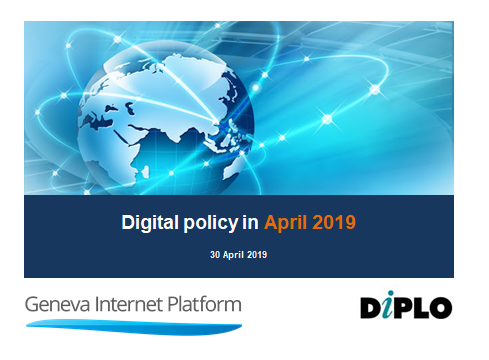
Upcoming elections trigger fresh misinformation concerns; new data breaches lead to more pressure on companies; and an increased focus on digital health were among the main digital policy trends in April 2019.
These and many other developments, trends, and regional updates were covered during April’s just-in-time briefing on Internet governance – our monthly appointment on the last Tuesday of every month – which took place on 30 April 2019. They were also summarised in the Internet Governance Barometer for April and in Issue 39 of the Geneva Internet Platform (GIP) Digital Watch newsletter.
The briefing was led by DiploFoundation’s Director of Cybersecurity and E-diplomacy programmes Vladimir Radunović, joined by DiploFoundation’s Digital Policy Senior Researcher Marília Maciel, DiploFoundation’s Senior Lecturer, Researcher, and Project Manager Katharina Höne, and DiploFoundation’s Multimedia Co-ordinator Arvin Kamberi.
A look back at events in April 2019
Maciel and Radunović spoke about major Internet governance events from which GIP) rapporteurs provided just-in-time reporting in April 2019. Maciel expounded on the UNCTAD eCommerce Week 2019 held between 1-5 April in Geneva. Radunović then spoke about the second Western Balkan Digital Summit held during 4-5 April 2019 in Belgrade, and the World Summit on the Information Society (WSIS) Forum 2019 held between 8-12 April in Geneva.
Main developments in April 
Radunović began by highlighting developments related to cybersecurity. G7 foreign ministers adopted the ‘Dinard Declaration on the Cyber Norm Initiative’. Russia’s State Duma (lower chamber) adopted a law on the stable operation of Runet, which should enable the country to disconnect its Internet traffic from foreign servers if needed. Kamberi then explained China’s considerations regarding the shutting down of cryptocurrency mining operations. Next, Radunović touched upon Wikileaks founder Julian Assange’s political asylum being revoked by the Ecuadorian Embassy, followed by Assange’s arrest by the UK police, and Ecuador reporting a high level of cyber-attacks on its institutions following his arrest. Radunović also mentioned the ongoing controversy over Huawei’s 5G equipment as the US Department of State warned it might stop sharing intelligence with countries that use Huawei equipment, including the UK. Höne zoomed in on two developments concerning artificial intelligence (AI), including AI researchers signing a letter calling on Amazon to stop selling facial-recognition technology to law enforcement agencies and the EU High-Level Expert Group presenting ethics guidelines for trustworthy AI.
Digital policy trends in April
- Upcoming elections trigger fresh concerns over misinformation. Misinformation is one of the biggest issues related to digital technology in 2019, Maciel explained.Tech companies are taking measures: Facebook has tightened its policy strategies ahead of India’s general elections, including political ad transparency policies, and setting up regional operation centers in order to speed up the reaction against fake news. However, the policy updates might not work everywhere: The European Commission has sent a letter to Facebook’s head of global affairs advising the platform to rethink its rules aimed at protecting elections from foreign interference. As Facebook’s new rules require political advertisers to register in the country that is the target of the campaign, they could prevent European political groups from advertising cross-border campaigns for the European elections in May. Maciel pointed out that the interesting shift in developing company policies which takes into account geographical boundaries.
- New data breaches create more pressure on companies. Facebook is in the spotlight again, Maciel elucidated, as two large troves of Facebook user data posted publicly on Amazon cloud servers were discovered while researchers also found that Facebook also harvested private data (1.5 million e-mail addresses) without consent.
- Digital health in focus. Radunović explained that recommendations and updated legal frameworks have pushed digital health and health data into focus. The World Health Organization (WHO) published a guideline recommending ten ways in which countries can use digital health technology to improve people’s health. The WHO is also offering guidelines on the amount of screen-time for children as it impacts sleep and motorics. The French health ministry updated its legal framework for hosting health data, and in particular, the obligations for service providers and health practitioners when collecting and processing data. In next few months, we can expect digital health to be in increased focus.
Upcoming
Radunović then briefly enumerated the upcoming events in May, which included the fifth SEEDIG Annual Meeting and the 22nd Session of the Commission on Science and Technology for Development (CSTD). He also gave an overview of the upcoming activities of the GIP and DiploFoundation, which included publishing the April 2019 newsletter and the start of a new online course titled ‘Artificial Intelligence: Technology, Governance, and Policy Frameworks’.
Discussion
Regulation of data flows in international discussions and negotiations, possible use of blockchain to avoid censorship, and the link between transparency and AI were among topics discussed during the interactive session of the briefing.
Regional developments
Grace Mutung’u gave updates from Africa. The African Continental Free Trade Agreement (AfCFTA) has come into force. Jumia, the largest e-commerce platform in Africa, has been listed in the New York Stock Exchange (NYSE) through an initial public offering (IPO). The Executive Director of the Collaboration on International ICT Policy for East and Southern Africa (CIPESA), Wairagala Wakabi, was detained at the Julius Nyerere International Airport in Tanzania.

Amrita Choudhury gave an overview of digital policy developments in Asia. The Australian government passed the Criminal Code Amendment (sharing of abhorrent violent material) Bill which makes a crime for social media platforms not to promptly remove abhorrent violent material shared by their users. The GSM Association (GSMA) launched The Mobile Economy Pacific Islands 2019 report which underscores the potential of mobile technology in the Pacific region. Tamworth will become the first fully integrated smart city in Australia.

Updates from the Middle East and North Africa were provided by Noha Fathy. Banned social messaging apps are reportedly hinder emergency relief in Iran. The Dubai Future Council on Artificial Intelligence held its first meeting in April 2019 and started discussions on how AI can be used to ‘enhance Dubai’s status as a future global city’.

Andre Edwards provided updates from the Caribbean region. A blockchain project focused on streamlining the agriculture value chain has been launched in Haiti. Orange’s French Caribbean subsea cable, which connects French Guiana with Martinique and Guadeloupe, was upgraded.





